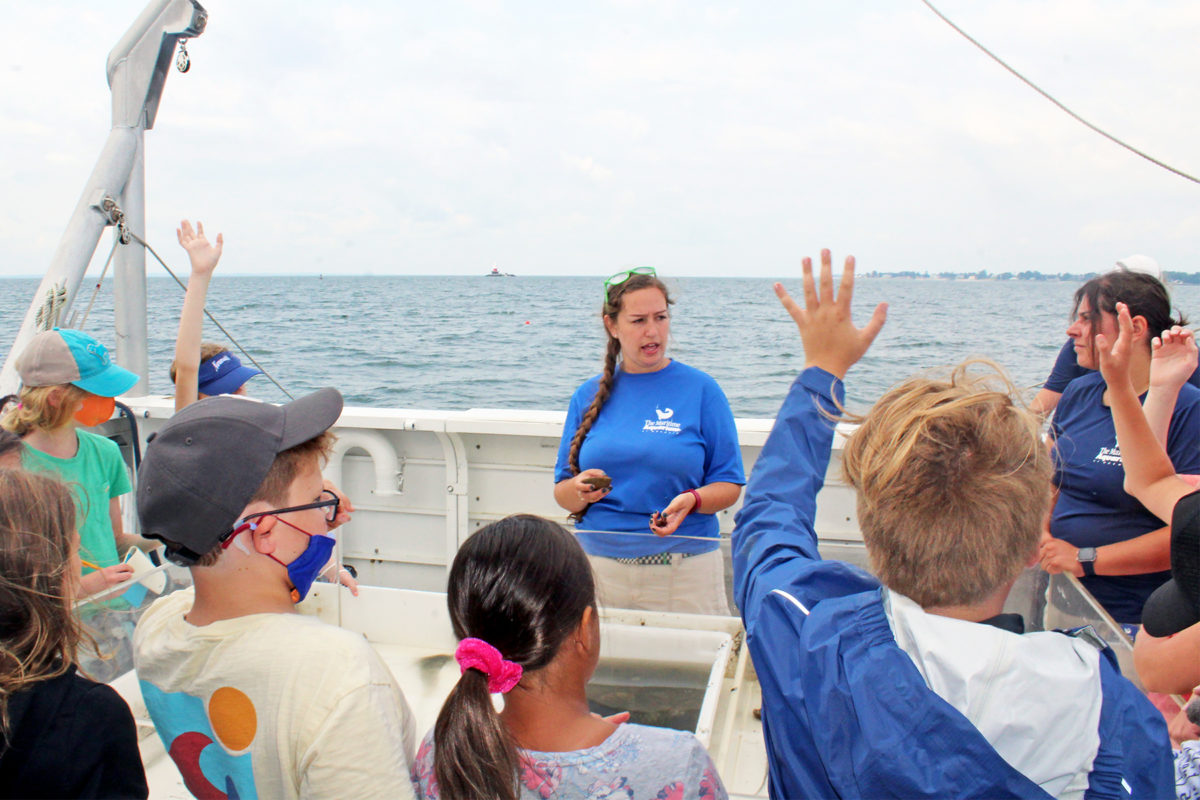Before the Covid-19 pandemic, the Maritime Aquarium at Norwalk typically drew close to 500,000 visitors a year. But when the pandemic took root, the renowned aquarium had no choice but to close its doors to visitors and pivot quickly to providing not just the city — and the wider world — with award-winning online educational programs.
Prior to the pandemic, the Maritime Aquarium’s educational offerings included in-house classes where students visited the facility to learn more about the world around them, as well as field programs, which traded the classroom for either a research vessel or the shoreline.
The aquarium’s traveling teacher program also provided educators to classrooms across the tri-state area, and the organization’s dedication to providing a STEM education to learners of all ages sparked the launch of the Maritime Odyssey Preschool in 2006, providing 200 students in the city’s poorest neighborhood with valuable pre-kindergarten education.

Tom Naiman, the aquarium’s vice president of education, remembered the dramatic pandemic-induced changes to the entire program.
“It was March of 2020 and the aquarium decided it was going to close on the 13th,” he recalled. “Norwalk Public Schools also decided it was going to close on that day.”
Instead of merely accepting the closure, the education team sprang into action and created new online resources.
“I knew right away that the shift to digital learning was going to be an incredibly dramatic and difficult experience for all involved,” Naiman said.
Luckily for him, Naiman had prior experience in developing digital learning experiences along with a motivated team of employees and volunteers. Naiman said that if not for the necessity imposed by the pandemic, the innovation never would have happened.
“If you had announced in March 2020 that starting in September all instruction was going to be virtual, if there had been no pandemic, everybody would have been up in arms,” Naiman stated. “They would be saying that isn’t possible and there’s no way it could be done in six months.”
The Maritime Aquarium immediately reached out to Norwalk STEM teachers on March 13, 2020, and the first versions of the pilot programs were ready for presentation via Zoom in 13 days. The sessions, which were hosted by an aquarium instructor instead of a pre-recorded video, produced were a hit.
“The aquarium was, of course, closed and only essential personnel were allowed,” Naiman recalled. “So, we were doing it from our homes. Within two-and-a-half weeks of that initial meeting, we had produced these pilot versions. We said to ourselves, “You know, kids are home and parents are struggling to provide activities for them. So, on something of a whim we decided to do a trial run of making them available to the public.'”
The aquarium debuted a public portal for educators to sign up for the sessions a few days after the successful trial run with Norwalk students.
“I opened the portal the next day and I honestly almost fell out of my chair,” Naiman said. “Overnight, we had more than 150 registrants for the pilot programs. It showed there was a real hunger and need out there.”
Naiman had not expected any hits and said he would have been thrilled with even a dozen sessions booked.
A survey of teachers who had signed up revealed that the aquarium’s program had wound up on a list of online resources for teachers. Due to both the quality of their work and by being available in a more engaging format than those offered by other aquariums, they were continuously added to lists and their popularity grew further by word of mouth. Teachers in Florida who had never heard of Norwalk signed up, as did educators in California who lived near larger and well-renowned aquarium that didn’t have the same online offerings.
Ultimately, over 38,000 students would take part in the online educational programing developed by the education team at the Maritime Aquarium. Those students are spread across 45 states and in 12 countries, including Turkey and Indonesia. The impact of their efforts was recognized by the Association of Zoos and Aquariums (AZA) this past September with its Best Education Initiative Award — this was both the first time the AZA granted an education award for a digital program and the fifth time in six years the Maritime Aquarium has earned an AZA honor, a rare distinction among the association’s 241 member organizations.
The Maritime Aquarium’s virtual offerings include 52 different educational programs, ranging from the toddler-oriented “Fish Tails” to “Your Coast and Climate Change” designed for high schoolers. Several of the programs have also been translated into foreign languages.
As the latest phase of the pandemic hits and prompts school closures and online classes once again, the Maritime Aquarium is well prepared to help both the region and the world stay in school.


















